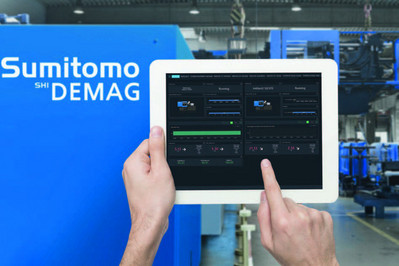Having access to real-time data not only transforms service models and increases machine uptime, it also leads to better and faster business decisions. At Fakuma 2024 booth B1-1105, Sumitomo (SHI) Demag will demonstrate to visitors how digital features like myAssist, automation, the company’s active modules and OPC-UA connectivity can help manufacturers optimise productivity and virtually eliminate machine downtime.
Providing greater processing transparency to help run machines at maximum efficiency, Sumitomo (SHI) Demag will unveil its recent advances in its myAssist software and how further optimisations offer processors even deeper data insights. Summarised by the company as the ‘ultimate digital process companion’, these newest upgrades include easy-to-read dashboards, consumption data and KPIs, all defined by the end user. The ability to use one interface to connect and oversee digital data across multiple machines in a single production facility is also available.
This level of high data transparency makes it possible to spot deviations, aggregate data captured from all OPC-UA filtered sources and react to changes in production processes at the earliest stage. Live data can be compared against any historical data. This comparison can be made on the basis of different time intervals, such as different production hours, weeks or even complete production orders.
“Having the ability to merge data from multiple sources allows for complete digital mapping of all production and environmental factors, including historical data,” notes Product Manager of Digital Solutions, Dr. Thomas Schilling. Adding Human Virtual Interface (HVI) and an Expertise module also enables users to put data findings into context by adding labels and more detailed annotations. In turn, this allows manufacturers to gain the greatest possible value from their data. This option will be available on all new IntElect machines from 1 January, 2025.
Creating connections and standard interfaces
Data holds intrinsic value with the ability to optimise productivity and increase profitability, but only if it is collected and handled correctly. With the momentum and move towards smart manufacturing and Open Platform Communications Unified Architecture (OPC-UA) interoperability continuing at pace, Sumitomo (SHI) Demag will explain how the company is facilitating scalable and extendible communication between injection moulding machines, periphery equipment and automation.
One of the biggest obstacles to machine learning and digital factories of the future is not having a standard interface, asserts Thomas Schilling. “For seamless communication to take place across machinery assets, all of the elements, including sensors and processing data, needs to talk to one another in the same language. That’s what OPC-UA seeks to accomplish - a universally compatible digital interface. Which ultimately delivers time savings and productivity benefits to injection moulders,” adds the digital expert.
Data transparency in the digital age
Expected to come into effect from 2026, The European Commission (EC) are introducing Digital Product Passports (DPPs) as a response to their ‘net-zero emissions by 2050’ target and overall sustainability goals. Under this forthcoming legislation, companies selling products in Europe will need to digitally collect and share detailed data about their products and processes. A DPP will contain the information of an entire product lifecycle, including the product’s composition, origins, production, and recyclability, with the aim of accomplishing full processing transparency, unlocking circularity and shaping the future of supply chains.
The EU recommends that companies take early action to digitise record-keeping, increase data collection and optimise processing practices. This suggestion comes from a desire for plastics manufacturers to improve their compliance and resilience, bridge the data gaps across the supply chain that obscure product footprints, unlock investment synergies and increase transparency. By preparing for DPPs now, companies can also mitigate the impact of non-compliance when the legislation comes into force.
As part of this increased push for digitisation, connected data sets, and assessment of sustainability efforts, Sumitomo (SHI) Demag has created a suite of advanced digital tools and cross-platform, open-communication software. “In today’s modern market, plastics processors need to meet higher demands for productive, energy efficient, sustainable processes, in order to achieve ambitious growth targets and meet stricter government standards. The key to success is total integration and seamless interactive connectivity between all devices, from injection moulding machines and robotics to temperature controllers and mould flow digital tools,” states Thomas Schilling.
Productivity parameters under pressure
One of the many digital features Sumitomo (SHI) Demag is showcasing at Fakuma 2024 is activeMeltControl. A completely independent software module, activeMeltControl can compensate for melt viscosity variations in nearly all applications and materials, including recycled plastics. Resulting in significantly reduced reject rates.
Automatically adapting to the injection moulding process, aMC continually monitors for variations in holding pressure and switch over position. Once a parameter is identified as drifting towards the tolerance limits that have been set by the user, aMC automatically amends the set parameters to compensate for the variation. The adjustment bandwidth is also defined by the processor.
Schilling expands: “Variations in the melt flow index (MFI) in 100% recycled material, for example, can now be corrected by the software. Meaning that the process stability is now comparable to a process that uses virgin material. This offers processors greater manufacturing flexibility, allowing for the use of a broader range of post-consumer and post-industrial recycled material types.”
Even customers with defined processing references benefit, as aMC instantly addresses any variability to maintain absolute processing precision and stability, adds Thomas Schilling. “In terms of production stability, this innovation makes a big difference to productivity and processing continuity.”
Visit Sumitomo (SHI) Demag at Fakuma 2024, booth B1-1105, to see these transformative digital tools in action and gain insight into how to best digitalise production processes for EU compliance, strengthen supply chain transparency and achieve your sustainability goals.

